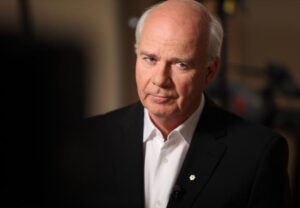The Peter Mansbridge Investigative Writing Award will benefit students in King’s Master of Journalism and Master of Fine Arts in Creative Nonfiction
A $100,000 gift from esteemed Canadian journalist Peter Mansbridge will endow a new scholarship, the Peter Mansbridge Investigative Writing Award, to be awarded annually to a student in the second year of the Master of Journalism (MJ) Program or the Master of Fine Arts, Nonfiction stream. Valued at $4,000 annually, the award will assist with costs of travel and research for a MJ professional project or Creative Nonfiction MFA book project that exemplifies excellence in investigative research and writing.

Peter Mansbridge
“As we watch the landscape of journalism change, I was motivated to invest in this national idea,” says Mansbridge. “There are distinctions in the awards which will be in place at each university. The aim is to encourage the best in quality, emerging journalistic talent, and I’m confident these great institutions will use these funds to do just that.”
“We are honoured by Peter Mansbridge’s generous endowment of this award,” said Associate Professor and Director of Journalism Fred Vallance-Jones. “It will help King’s journalism students continue our longstanding commitment to investigative and enterprise reporting. Master of Journalism students need to complete a major work of journalism as part of their degree and many of these have been investigative projects, such as stories on the impact of Covid-19 on Indigenous communities, a mapping analysis of the threat of sea-level rise to Halifax and recent stories on online hate and human trafficking.”
Vallance-Jones highlighted the fact that King’s journalism investigations have been recognized by numerous awards and award nominations. The accolades range from regional awards such as the Atlantic Journalism Awards to a nomination for one of the most prestigious awards in Canada, the National Newspaper Award, for investigations.
Director of Writing & Publishing Gillian Turnbull oversees the Master of Fine Arts in Creative Nonfiction. Turnbull said the award will provide “vital support to students conducting book-length investigative work.”
“The award will go a long way toward helping the students in our Creative Nonfiction MFA program develop their manuscripts. A core part of the MFA program is our strong emphasis on research: training students to conduct intensive fieldwork, in-depth interviews, and archival investigations.”
“Many of the books that have come out of the MFA program have won awards and had a major impact on the nonfiction field,” said Turnbull, citing Jessica McDiarmid’s Highway of Tears (2020), about the failure to provide justice for missing and murdered Indigenous women and Gregor Craigie’s On Borrowed Time (2021), an examination of the science behind earthquakes. Craigie’s book was a finalist for both the Balsillie Prize for Public Policy and the Victoria Butler Book Prize.
To apply for the award, interested students in the Master of Journalism or the Master of Fine Arts in Creative Nonfiction program must obtain a letter of support from the Journalism faculty member or Writing & Publishing cohort director overseeing their project and a budget for their proposal.
A selection jury made up of the Director of Writing & Publishing, the Director of Journalism and a third individual who is a prominent scholar in investigative research and writing will select the winning project based on the following criteria:
- The project is investigative in nature, in that it aims to make public information that would otherwise remain hidden, and in doing so serves the broad public interest, seeking to prompt change or build awareness, such as in/of public policy;
- The project has strong publication potential, in the opinion of the selection jury;
- The funds are required to complete the project, allowing travel for interviews and fieldwork, expenditures on essential research-related costs such as fees for freedom of information requests or public document searches, and other costs directly related to the project that are not otherwise covered by the programs.

